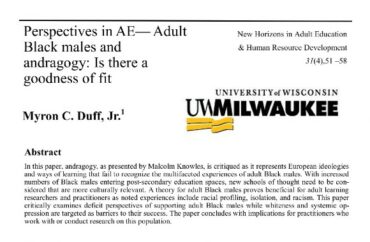
UPDATED
‘Practice of whiteness creates barriers for populations of color,’ adult ed class teaches
University of Wisconsin students recently had to read a “racist and offensive” assignment that portrays “whiteness” as “oppressive,” according to a student taking the adult education class.
Grae O’Leary Hosmanek, a graduate student at the public university’s Milwaukee campus, told The College Fix via email the assignment stood out in her “Principles and Foundations of Adult Education” class because of its “blatantly anti-white sentiment.”
“Unlike the others we read that week, which focused on neurology and the learning process (as this is a class on Adult Education), an article with blatantly anti-white sentiment stood out starkly,” she said.
The spring semester course, taught by education Professor Liliana Mina, aims to introduce “concepts, theories, and principles of adult education; the nature of the adult learning process; and factors that influence and facilitate adult learning,” according to a course syllabus provided to The Fix.
However, Hosmanek said an assignment given during the first week of class did not fit with these objectives.
The assigned reading, “Perspectives in AE – Adult Black males and andragogy: Is there a goodness of fit,” examines “deficit perspectives of supporting Black males while whiteness and systemic oppression are targeted as barriers to their success,” according to a copy of the assignment obtained by The Fix.
Hosmanek pointed out passages to The Fix that she deemed “racist and offensive.” They included:
“As a result, the oppressive practice of whiteness creates barriers for populations of color that impede their academic success and employment opportunities. These same marginalized groups are blamed by the dominant culture and even others of color for a plight that is precipitated by the racist practices of Whiteness.”
“For Whites, discussions of whiteness remain useless unless their own racist harms and practices are evidenced. If conversations around white privilege are void of self-analysis, transformation is stifled and the systems of oppression are more firmly embedded in the psyche of whites.”
Because the professor is black and she is white, Hosmanek said she was worried about approaching Mina about the reading.
Instead, Hosmanek said she sent an email to Susan Donohue Davies, UWM’s assistant director of Human Resources and Labor Relations, but the response did not satisfy her.
“I was highly disheartened that such a reading would make it into any UWM course, let alone one that is so blatantly racist and incorrect,” she told Davies in the Feb. 14 email, shared with The Fix. “I feel it is highly inappropriate for a professor to assign a reading attacking individuals on the basis of race.”
Hosmanek pointed Davies to several quotes from the article that she said are “objectively racist and offensive.”
“I cannot imagine that, if the words ‘white’ and ‘whiteness’ were replaced with ‘black’ and ‘blackness,’ this article would for a single minute be deemed appropriate in any setting, let alone one of a graduate-level academic setting,” O’Leary Hosmanek wrote.
In a response Feb. 15, Davies told the student that “hearing many perspectives is part of learning,” according to a copy of the email provided to The Fix.
“You don’t have to agree. Thinking about how to disagree (within the context of the class and its objectives) can be a valuable learning experience,” Davies wrote.
Hosmanek told The Fix the school’s response shows how “the only acceptable form of racism is now anti-white racism.”
“I thought we aimed to live in a world where we would be judged by the content of our character, not the color of our skin, but the only thing that matters now is the color of your skin, and it better not be white,” she said.
The Fix contacted Mina, Davies, and UWM’s media relations team for comment twice in the past two weeks, asking if they have received any other complaints about the reading assignment, but none responded.
The syllabus for the class also discusses “bias free language” and various “identities.”
In a section titled “Bias Free Language,” Mina instructs students to use their classmates’ preferred pronouns and links to a UWM “Pronouns Guide,” which lists xe/xem, fae/faer, and per/per along with he/him and she/her, according to a copy shared with The Fix.
The syllabus also tells students to respect other language “relating to people and their identities.”
“It is disrespectful to use a perceived identity as an adjective describing the person (e.g., handicapped student, disabled person, black student, gay woman, etc.) or as a noun describing a group of people (e.g., the autistic students) perceived as (dis)abled, educationally at-risk, linguistically diverse, or by race, sexuality, gender, religion, socio-economic level, or body image,” the syllabus states.
“This language can inadvertently elicit stereotypes that reinforce biases that overshadow an individual and their identities. Therefore, language, verbal and written, should reflect person-first language (e.g., people with disabilities, a student experiencing poverty, etc.).”
Editor’s note: The headline has been updated.
MORE: Vanderbilt professor: Climate change stories ‘cater to the white consciousness’
IMAGE: New Horizons in Adult Education and Human Resource Development





Please join the conversation about our stories on Facebook, Twitter, Instagram, Reddit, MeWe, Rumble, Gab, Minds and Gettr.